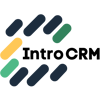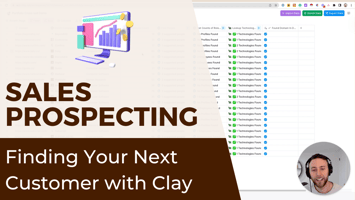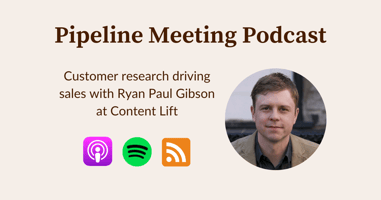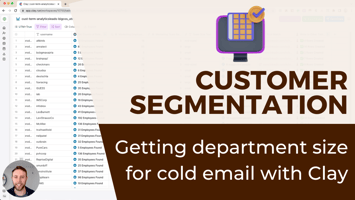Sales prospecting is difficult if you're relying on the same tools as every other salesperson. Most...
Getting your first customers with Bryan Clayton at GreenPal
Bryan Clayton, CEO and Co-Founder of Green Pal, joins the Pipeline Meeting to talk about getting your first customers, building a two-sided marketplace, and building a software company after selling his service business.
Show Description
Where B2B marketers come to talk sales. 15-minute interviews published every Monday and Wednesday morning. For heads of marketing and founders who support a sales team.
Subscribe
Popular Platforms
Apple Podcasts
Spotify
RSS Feed
Also available:
Amazon | Anghami | Castbox | Castro | Deezer | GoodPods | Google Podcasts | iHeart Radio | Overcast | Pandora | PlayerFM | Pocket Casts | Podcast Index | Podchaser | Stitcher | TuneIn
Show Notes
Bryan Clayton is the Co-Founder and CEO of GreenPal, an online marketplace that connects homeowners with local lawn care professionals.
GreenPal has been called the “Uber for lawn care” by Entrepreneur magazine and has over 100,000 active users completing thousands of transactions per day.
In this interview, Bryan talks about getting your first customers, building a two-sided marketplace, and building a software company after selling his service business.
Follow Bryan Clayton on Instagram: https://www.instagram.com/bryanmclayton/
Learn more about GreenPal: https://www.yourgreenpal.com/
Transcript
[00:00:00] Introduction
[00:00:00] Harris Kenny: Welcome to Pipeline Meeting where marketers come to talk about sales. I'm your host Harris, Kenny, and I'll be joined by guest every Monday and Wednesday for brief 15 minute interviews where we'll share tips that you can apply to support your sales team and help them close more deals.
[00:00:15] Harris Kenny: If you don't have time to listen to this whole episode, you can skip ahead in the show notes in your podcast player, or find the transcript at introcrm.com/podcast. All the episodes are published there.
[00:00:28] Pre-Interview
[00:00:28] Harris Kenny: This episode is a little bit different. We've got the CEO and co-founder of a startup who talks about the early days of building his business. Now there's the tech side and there's the sales side.
[00:00:39] Harris Kenny: What I think that our listeners are going to find especially interesting is all the effort that it took to build this before a marketer could come in all the effort it took before conventional sales and other go-to-market motions could be used.
[00:00:54] Harris Kenny: It's a bootstrapped company, a really cool story. And it might be something that you want to try this spring.
[00:01:00] About Green Pal
[00:01:00] Bryan Clayton: I'm CEO/Co-Founder of an app called Green Pal, and in one sentence, it's like the Uber, but for lawn mowing services. So if you're a homeowner, you need to get your grass cut. Rather than calling around on Craigslist or something like that, you just download our app. Pop your address in, you quickly get back quotes from long care services nearby.
[00:01:17] Bryan Clayton: You hire the one that you wanna work with. They come out, take care of the chore for you. And if you like how they did, you just book them for the whole season right on the app so you find, schedule and pay them all through the app. Then at this, I guess you could say we're like a nine or a 10 year overnight success.
[00:01:31] Bryan Clayton: We we're now nationwide, United States like three, three or 400,000 people using the app and doing multiple eight figures a year in revenue. But it started off very humbly. My two co-founders and I almost 10 years ago in Nashville, Tennessee, where we live, and we just started out our first year trying to figure out how to build the Uber for lawn mowing and literally passed out door hangers all over Nashville, Tennessee, trying to beg people to use this app we had built.
[00:01:58] Bryan Clayton: When you're starting a marketplace like this particularly a local marketplace that has real world implications, you're moving atoms around a lot of things can go wrong and you just slowly fix those things with software.
[00:02:10] Bryan Clayton: And try to figure out what the root cause is of, of all these problems and, and fix them with the app.
[00:02:15] Bryan Clayton: On top of that, we kind of taught ourselves how to build software along the way. We, none of us, my two co-founders and I did not know how to write code when we first started, and now, we're software developers.
[00:02:25] Bryan Clayton: It's been a hell of a journey, but one that I'm glad that I did. If I had known how hard it was gonna be, I never would've done it. Here we are now, we got a good, good marketplace running. It's profitable.
[00:02:33] Getting Your First 100 Customers
[00:02:33] Harris Kenny: Tell me about those early customers. You said you were knocking on doors. Did you have this idea and like jump right into it? Or was there any experimentation around what you wanted to build In the beginning?
[00:02:46] Bryan Clayton: My first business was a landscaping company. I started mowing grass and like when I was a teenager and, and stuck with this little lawn mowing business all through high school, all through college, over a 15 year period of time from like age 18 to 33.
[00:03:02] Bryan Clayton: I, I had built one of the largest landscaping companies in the state of Tennessee. Eventually getting that business over 150 employees, around 10 million a year in revenue.
[00:03:11] Bryan Clayton: In 2013, that business was acquired by, by a conglomerate. So after that, I retired. I like took a year off, got really bored and thought, well, what now? What should I do now?
[00:03:21] Bryan Clayton: I knew there was a problem. I was kind of solving my own problem in terms of, I knew it was difficult for homeowners to get hooked up with good lawn care services.
[00:03:28] Bryan Clayton: I saw this problem every day running that company and I thought, well, you know, I don't wanna like start another contracting business cause or another service based business. Cause that was really hard.
[00:03:36] Bryan Clayton: I wanna start a software business because that'll be so much easier. And boy, I didn't know what I didn't know. It was like naivete as an asset.
[00:03:43] Bryan Clayton: The only thing we had going for ourselves was, it was almost like authenticity as a competitive advantage. I kind of knew the problem, I knew the space very well, but I didn't know how to build software.
[00:03:52] Bryan Clayton: The idea of like, you shouldn't have to call around, leave voicemails, send text messages to try to wrangle somebody to come cut your grass for you. You should just be able to order it like a DoorDash. Then it's the same as it is now. It, it's just that we spent the decade solving the million things that can go wrong when you order a lawn mowing service. You know there's a, there's, there's literally like a thousand things that happen. You know, the case of the disappearing lawn guy is very real.
[00:04:18] Bryan Clayton: And our software, our platform solves those problems for consumers. while making it easier for, for vendors to make more money and with less hassle. So we kinda like add value to both. We have to add value to both sides of the transaction house. It wouldn't work and, and we've just been making it better and better and better is focus on this one use case, this one chore for a decade.
[00:04:37] Two-Sided Marketplaces
[00:04:37] Harris Kenny: which side did you focus on? I mean, I know it's both right? Cause it's a two-sided marketplace, but did you go out and get customers and then tell 'em, Hey, look, I've got a hundred people who want their lawns cut. Who wants to win this business? Or did you go the other way? How did you think about that in the beginning?
[00:04:48] Bryan Clayton: Yeah, it's a good question. You know, it's that cold start problem that, that every marketplace goes through, and you have to just kind of hand crank your way through it, which is what we did, and, and so. My previous company did not participate. That was a big con, commercial based operation, you know, doing office parks, apartments, hotels, airports, things like that.
[00:05:10] Bryan Clayton: Green Pal was, and still is the easiest way for a homeowner to order a basic lawn mowing service. Those are almost like, they seems like similar industries. They're two completely different industries. They're as related as home cleaning and lawn care, so, and so, I mean, they're really two different businesses, but I did have contacts in, in terms of like people that, that were making a living mowing yards.
[00:05:31] Bryan Clayton: Just because I was a little bit of a known commodity. I had like one of the, the largest companies in the region. And so I was able to call those folks and pitch the mail on the idea. Of, Hey, you know, try this app that I have built and and, you know, just, just see. Tell me what you think.
[00:05:46] Bryan Clayton: About one in 10 would, would get in there and try it with, with us. And then what I, what I stumbled upon was, well, there's just so much apathy on the supply side right now because our app sucks. I need some glue. I need something to get these guys to stick around. I started offering free coaching and free mentoring to like the first like hundred lawn care services that used the app.
[00:06:06] Bryan Clayton: Literally, every one of them had my cell phone number and, and I would talk to them seven days a week on how to grow their lawn mowing business. That gave us like some breathing room to not have to focus on the supply side for just a little bit to where we could then just focus all of our intensity on the consumer side.
[00:06:22] Bryan Clayton: And that was just enough to kind of kick off a little flywheel. In, in Nashville, Tennessee, one market. That's how we developed our playbook to then move into other cities. And we spent three years just in one city trying to figure it out. And then after that, we moved into our second, third, fourth city, and now we're nationwide in the United States, but those early days of hand cranking it were critical because there's just so much that has to be done.
[00:06:46] Bryan Clayton: Not only that, you don't even know what to do because you don't have the real world product experience. Like you don't have the, the, the real world interactions occurring on your platforms. You don't really know what to build.
[00:06:57] Bryan Clayton: So
[00:06:57] Harris Kenny: Mm-hmm.
[00:06:58] Bryan Clayton: one that we kind of eased our way into and, and almost triaged a lot of it, a lot of those early days is just triage around, okay, what is the single biggest problem on the platform right now? . Well the people hire a lawn care service, but they still don't show up. Well, why aren't they showing up?
[00:07:14] Bryan Clayton: Let's get down to the user psychology of that. Well, because they're not making enough money. Well, why aren't they making enough money? They quoted it Well, they quote, they quoted it too low. Well, why did they quote it too low? Well, because the, it, the grass was, was, was two foot taller than the homeowner said.
[00:07:29] Bryan Clayton: Okay. Well, how do we solve that problem? You know, like, and that's just one of a million things that go wrong with like a real world interaction between two buyers and sellers that we have solved, you know, little by little over time.
[00:07:41] Things That Don't Scale
[00:07:41] Harris Kenny: I'm so interested to hear how you said you bundled that coaching service.
[00:07:45] Bryan Clayton: It really is a video game. You have to work through every level of the game and you have to do whatever it takes to get to the next level. We passed out door hangers all over our city to get a hundred consumers to use it. And we knew that we couldn't build a million multimillion dollar platform passing out flyers, but it was what we had to do at level.
[00:08:07] Bryan Clayton: To get a hundred people so that we could learn from those hundred people. And a lot of, a lot of the early days is just learnings. It's just really getting the feedback to understand if you're on the right track, because you're inventing something from scratch, you're inventing something that doesn't yet exist.
[00:08:22] Bryan Clayton: And little by little you ease off of like, completely like high touch experience to a self-serve one. But it's not, you can't start self-serve. I mean, very rarely, unless you're just some kind of product savant. I mean, it's, it's hard to do that. You have to hand crank these things and, and pretty much every founder story, you know, every big company did that.
[00:08:44] Bryan Clayton: You know, there's a story of Instacart where those, those that team went to their local grocery store and, and, and there was no API to figure out inventory. There was no, there was no way, like they, they, so they bought one of Everyth. At the grocery store and they took it back to their apartment and photographed it all with a digital camera and put it on their website.
[00:09:06] Bryan Clayton: So, so that's what they did to hand crank like inventory and figure out how to, how to develop a SKU based system. So like, ask yourself that before you wanna go start a. A marketplace doing anything, would you go to your Kroger and buy one of every single thing there and take it back to your apartment and photograph it and put it on your website?
[00:09:24] Bryan Clayton: If you're not willing to do that, then then don't start a marketplace because it's those types of things you have to do to hand crank it to get the flywheel going.
[00:09:32] Scaling the Business
[00:09:32] Harris Kenny: What was the first thing that changed for you as you felt like that was shifting underneath you, within the business? That all of that, grit was starting to pay off and all of a sudden you realized, Hey, I'm sort of sitting on not an at ATM machine, but I'm sitting on something that's standing on its own generating this cash flow.
[00:09:47] Harris Kenny: When did that happen and then what did you do? What did it feel like?
[00:09:50] Bryan Clayton: Yeah, that's a really good question. You know, self-funding and bootstrapping of. Can be a lot like chess. It's a slow build. No one move wins the game. It's just strategic. It's, it's, it's one that you, you're, you're building on your, your momentum and you're building on your previous decision and making, whereas like starting a venture back startup is more like poker.
[00:10:13] Bryan Clayton: Where you're making these calculated bets. They're, they're winner take all in many cases. It's, it's high stakes high, high cost of failure if you're wrong. And, and so so it's the difference between chefs and poker really. And, and from my viewpoint. And, and so for me, you know, the first four years were very much like an exercise of, of managing personal psychology, where it was just like, well, you know, I mean, we, we, the business literally made like 50 grand last year.
[00:10:47] Bryan Clayton: like, like all in like, like, like, like this is not a business, but I can, I can see, I can see where it's going. If it, if it doubles and then doubles again, and then doubles again, and then doubles again, we'll have something. And, you know, we did double last year. And so it's very much an exercise in, in the management of one's personal psychology.
[00:11:06] Bryan Clayton: That was just all there was to it. And, you know, like I was gonna get outta bed every morning and I was gonna go down to, to the office and I was gonna work my ass off on my best idea. And fortunately, I'm not terribly creative. because that was my best idea still is I don't have any better ideas and so, and so this is it, you know, we're gonna grind on this thing and see, and see how far we can take it.
[00:11:27] Bryan Clayton: And so that got me through the first three or four years. And then, and then maybe like year three or four, you start to make a little bit of money. And then as the founder, you realize your role is less of. Chief blog, post writer and chief code, writer and chief, like pr specialists, you know, all the things you're doing in the business.
[00:11:49] Bryan Clayton: And then you shift into one of a capital allocator and, and then you understand that, okay, yeah, we made 10 grand last month and I get to figure out how to spend that 10 grand to make more money. and, and so, okay, well, where, and then again, go back to triage. Well, where do we, where do we really need the most blocking and tackling?
[00:12:07] Bryan Clayton: We taught ourselves how to write code, but we suck. We need a professional CTO. And, and you start looking, well, these guys make $250 an hour. That's really what we need.
[00:12:16] Bryan Clayton: Then you hire that person and then it's like almost like a superpower and. Wow, this is incredible. Look how much faster we're moving. This is great.
[00:12:24] Bryan Clayton: And you start making more money. And then, and then, okay, well now what do I need?
[00:12:27] Bryan Clayton: Well, I'm doing SEO and I'm pretty good at it, but I need somebody's like, focus just on that. We need to hire professional SEO person. And so you're starting to make this money and you're putting money back to work.
[00:12:39] Bryan Clayton: Once you see the power of delegation and you see the power of build a great product, make customers happy. Customers stick around, make some money, make the product better, get more customers.
[00:12:52] Bryan Clayton: Once you see that flywheel start to move, however slow you can then start to see, okay, now I get where this is going, and then success is inevitable. Inevitability, and, and that happened for me maybe year four. So the first, like two or three years, were very much an exercise in faith, managing my personal, my team too, not just me, my two co-founders you know, managing our personal psychology.
[00:13:15] Bryan Clayton: And if had we raised capital one or two things would've happened, we would've gone through that process and in six months rather than four years, or we would've gone outta business. So, and the likelihood of going outta business was, Probably three to one, maybe even more. And so, you know, capital can accelerate things in, in, in a positive direction or a negative one.
[00:13:39] Following Bryan Clayton
[00:13:39] Harris Kenny: Let me know where can people find you? Are you active on LinkedIn, on Twitter?
[00:13:42] Bryan Clayton: Yeah, well first, if anybody doesn't wanna mow your own yard, just go to green pal.com or Green Pal in the app store or play store and just get, get the chore done. And a push of a button. Anybody wants to hit me up. Instagram's the best place to reach me. Brian M. Clayton, drop me up. Follow and a DM There I'll hit you back.
[00:13:59] Closing Credits
[00:13:59] Harris Kenny: That's all for now. You can find show notes at intro crm.com/podcast. The theme music for Pipeline Meeting is by Neighbourhood Vandal. If you learned something, consider sharing this show with a friend. Thanks for listening.



